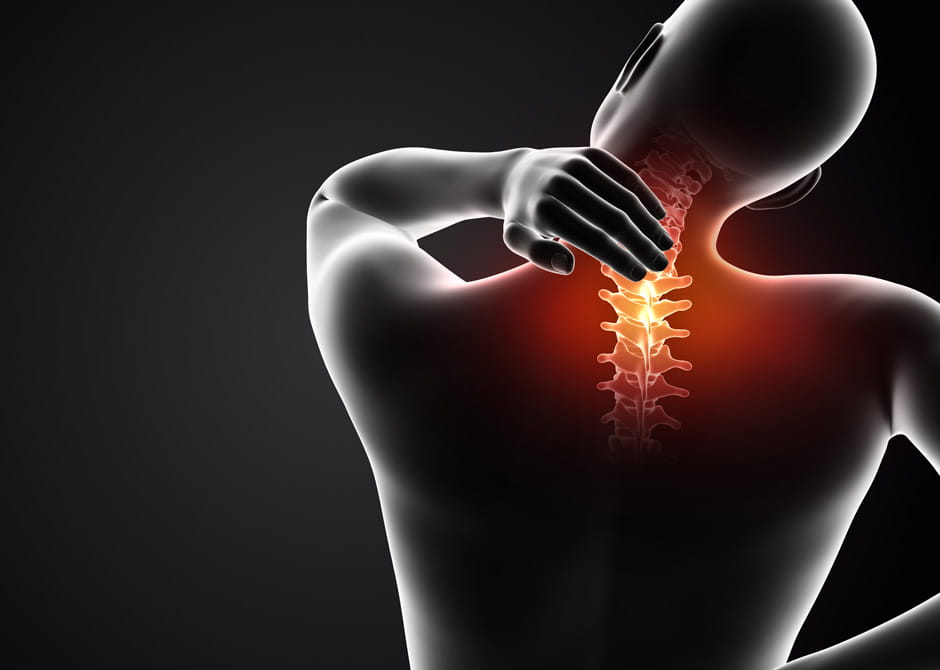 What is neck pain?
What is neck pain?
Cervicalgia is a clinical term used to describe neck pain or discomfort in the cervical spine, which is the upper portion of the spine located in the neck region. Neck pain can be caused by muscle strains, ligament sprains, poor posture, injury or underlying conditions such as arthritis or herniated discs.
What are some common causes of neck pain?
Some of the most common causes of neck pain can be:
- Muscle strain or tension
- Cervical disc herniation
- Degenerative disc disease
- Cervical spinal stenosis
- Whiplash injury
- Poor posture
- Osteoarthritis
- Nerve compression, or pinched nerves
- Traumatic injuries, such as fractures or sprains
- Tumors or infections in the neck region
What are common neck pain symptoms?
- Stiffness or inflexibility in neck muscles
- Discomfort or soreness, ranging from mild to severe, which certain activities can make worse
- Limited range of neck motion
- Headaches
- Shoulder pain
- Numbness or tingling sensation
- Weakness or reduced strength
- Radiating pain from the neck into other areas of the body (such as the shoulders, arms or upper back)
How can you treat neck pain at home?
There are several remedies and exercises aimed at reducing muscle tension, improving flexibility and promoting relaxation. Some helpful strategies include:
- Gentle stretching exercises to help loosen tight muscles and improve flexibility in the neck.
- Alternating between heat and ice packs to help reduce inflammation and numb pain.
- Maintaining good posture throughout the day.
- Ergonomic adjustments to your workspace (using a supportive chair, adjusting computer monitor height, and positioning the keyboard and mouse at a comfortable level to reduce strain on the neck and shoulders).
- Practicing deep breathing exercises, meditation or yoga to help relieve stress, tension and muscle tightness in the neck and shoulders.
- Using over the counter medications like acetaminophen and ibuprofen.
More than anything, consistency is key when incorporating these remedies and exercises into your daily routine to effectively manage and prevent neck pain.
When is it necessary to see a doctor for neck pain?
When experiencing persistent or severe neck pain, it’s important to seek advanced care to address underlying conditions or complications as soon as possible. Putting it off might delay much-needed treatment or perhaps even a surgical procedure. Waiting to see a doctor can also cause the treatment and subsequent recovery time to be longer than necessary.
Here are some symptoms, conditions and reasons you may need to see a doctor for your neck pain:
- Persistent or worsening neck pain despite home remedies and self-care measures.
- Neck pain accompanied by neurological symptoms such as numbness, tingling or weakness in the arms or hands.
- Difficulty moving the neck or severe limitations in range of motion.
- Recent traumatic injury to the neck, such as a fall or car accident.
- History of cervical spine conditions or surgeries.
- Fever, unexplained weight loss or changes in bowel or bladder function.
- Neck pain that interferes with daily activities, work or sleep.
- Concerns about the possibility of serious underlying conditions such as cervical disc herniation, spinal stenosis or tumors.
What treatment options are available for neck pain?

Treatment decisions should be tailored to your specific symptoms, underlying conditions and overall health goals. Our spine experts work with cervicalgia patients to create a plan to alleviate discomfort, improve function and address root causes.
For mild to moderate symptoms, at-home techniques such as rest, heat or ice therapy, and over the counter pain relievers can help manage mild to moderate symptoms. Physical therapy is often recommended to strengthen neck muscles, improve posture and increase range of motion through targeted exercises and stretches. In some cases, chiropractic adjustments or massage therapy can help, too.
For more severe or persistent cervicalgia, advanced medical interventions may be necessary. Corticosteroid injections can help reduce inflammation and alleviate pain around affected nerves or joints. If conservative measures fail to provide relief, surgical options such as cervical discectomy or fusion may be considered to address underlying structural issues such as herniated discs or spinal stenosis.
Additionally, alternative treatments like acupuncture or transcutaneous electrical nerve stimulation (TENS) may offer additional pain relief for some individuals.
How can you prevent neck pain?
Neck pain can be prevented (or reduced) with some lifestyle changes and practices. Some common techniques and approaches:
- Gentle stretching exercises can help loosen tight muscles and improve flexibility in the neck.
- Alternating between heat and ice packs can help reduce inflammation and numb pain.
- Maintaining good posture throughout the day.
- Ergonomic adjustments to your workspace, such as using a supportive chair, adjusting computer monitor height, and positioning the keyboard and mouse at a comfortable level to reduce strain on the neck and shoulders.
- Practice deep breathing exercises, meditation or yoga can help relieve stress, tension and muscle tightness in the neck and shoulders.
- Over-the-counter medications like acetaminophen and ibuprofen.
Spinal Stenosis
How would you like to schedule?
Don’t have MyChart? Create an account
